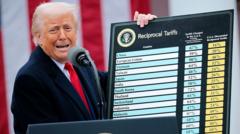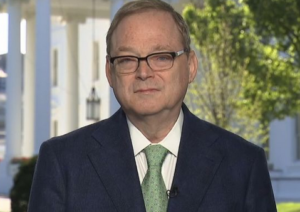Stock prices dropped as President Trump's latest tariff hikes raised tensions with China, leading to concerns about the economic repercussions on consumers and the market.
Trade War Escalates: U.S. Markets React to New Tariff Heights

Trade War Escalates: U.S. Markets React to New Tariff Heights
A deep dive into the unraveling U.S.-China trade relations and its impact on the markets.
U.S. stock markets faced significant declines yesterday amid the continuing tensions in the trade war with China, as investors weighed newly announced tariffs and their potential fallout. Treasury bonds also saw a sell-off while oil prices slipped alongside a downturn in major tech firms, including Apple and Nvidia.
President Trump recently confirmed a staggering 145 percent increase in tariffs on various Chinese goods, intensifying fears among investors that relations between Beijing and Washington are deteriorating. In a somewhat unexpected move, E.U. officials announced the postponement of retaliatory tariffs following Trump's decision to delay certain import tax implementations, although analysts remained skeptical about their effectiveness.
While markets initially responded positively to Trump's earlier announcements of delaying some tariffs, that optimism swiftly turned negative. “The president may have momentarily assuaged fears about the U.S. economy, but his simultaneous hikes on Chinese tariffs have overshadowed any sense of relief," remarked Ana Swanson, a trade policy analyst.
Many economists are bracing for the adverse effects of the newly implemented tariffs, particularly noting that essential consumer items—such as electronics and toys—are largely sourced from China. The broader consensus is that the implications of these trade policies may take time to fully materialize, leaving many in the economic field speculating about the direction the economy is headed as this trade conflict unfolds.























